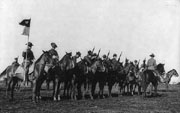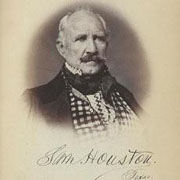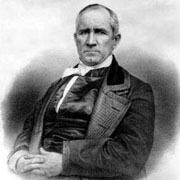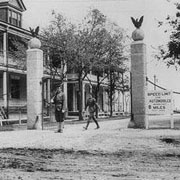VOA慢速英语2011--Sam Houston, 1793-1863: A 19th Century American Statesman, Politician, and Soldier
搜索关注在线英语听力室公众号:tingroom,领取免费英语资料大礼包。
(单词翻译)
People in America - Sam Houston, 1793-1863: A 19th Century American Statesman, Politician, and Soldier
STEVE EMBER: I’m Steve Ember.
NICOLE NICHOLS: And I’m Nicole Nichols with the VOA Special English program, People in America. Today, we continue the story of Sam Houston, a Texas hero.
(MUSIC)
STEVE EMBER: Last week, we reported on Sam Houston’s problems as commander-in-chief of the Texas army in eighteen-thirty-five. Texas belonged to Mexico at that time and had not yet become part of the United States.
Several Texas officers organized a small army and planned to attack Mexico without Houston’s permission. These officers told their men they could have all the riches they could find in Mexico.
Houston believed the planned attack on Mexico was wrong. So he resigned. But before he did, he ordered Texans in San Antonio to destroy the old Spanish fort called the Alamo. Houston did not think the Alamo could be defended against a strong Mexican attack.
 |
| Cavalry1 soldiers line up at Fort Sam Houston, Texas |
NICOLE NICHOLS: In February, eighteen-thirty-six, Texas representatives were preparing to meet. A few days before the meeting was to open, a message arrived from San Antonio. A Mexican army, led by President Santa Anna himself, was attacking about one-hundred-eighty Texans at the Alamo. Houston’s orders to destroy the fort had not been obeyed. Texas soldiers were spread across the area. There was no help to send to the Alamo.
The representatives decided2 that they must write a declaration of independence from Mexico. The declaration was signed on March second. Two days later, Sam Houston was elected commander-in-chief of the military forces of the Texas Republic.
STEVE EMBER: Houston said he would leave immediately for San Antonio. In two days, his Texas army grew to five-hundred men. However, help came too late for the men at the Alamo. Santa Anna’s forces captured the fort and killed every fighter there.
 The Mexican leader said death would be the punishment for every Texan who opposed him. Texans soon learned he meant what he said. Santa Anna’s forces captured more than three-hundred Texas soldiers near the town of Goliad. The soldiers surrendered when the Mexicans offered to treat them as prisoners of war and return them to the United States. Yet the Texans never saw freedom. They were marched away from town and shot to death.
The Mexican leader said death would be the punishment for every Texan who opposed him. Texans soon learned he meant what he said. Santa Anna’s forces captured more than three-hundred Texas soldiers near the town of Goliad. The soldiers surrendered when the Mexicans offered to treat them as prisoners of war and return them to the United States. Yet the Texans never saw freedom. They were marched away from town and shot to death.
NICOLE NICHOLS: Houston’s army continued to grow. However, few of his men were trained to fight. Houston decided his only hope was to withdraw until his soldiers were better trained and had more equipment. He marched his small force east, just ahead of Santa Anna’s soldiers.
Santa Anna and his force of one-thousand-two-hundred soldiers had camped on a flat grassy3 area near the San Jacinto River. On April twenty-first, eighteen-thirty-six, Houston and his soldiers fought the battle that would decide the future of Texas.
STEVE EMBER: The Texans formed a long line across the north end of the field. Then, they began moving toward the Mexican camp. Only a few meters from the Mexican defenses, the Texans fired. They shouted “Remember the Alamo!” and attacked the Mexican soldiers.
The battle of San Jacinto lasted only about twenty minutes. The Mexicans were completely defeated. Only six Texans were killed and twenty-four others wounded. One of the wounded was Sam Houston. The Texans killed or captured hundreds of enemy soldiers. But General Santa Anna could not be found.
NICOLE NICHOLS: Houston ordered the Texans to find Santa Anna. If the Mexican leader escaped, he could lead another army against Texas. The next day, a group of Texans found a small, sad-looking Mexican soldier. The Texans almost let him go. But when they brought this soldier near the other Mexican prisoners, there were shouts of, “El Presidente!” It was Santa Anna.
 |
| Sam Houston in 1848 |
Many of Houston’s men wanted to kill the Mexican leader. But Houston knew Santa Anna was more valuable alive than dead. Santa Anna was ordered to sign an agreement recognizing the independence of Texas. The Mexican leader was returned home. And Sam Houston became a hero. The town of Houston, Texas was named in his honor.
(MUSIC)
STEVE EMBER: The newly independent Lone4 Star Republic elected Sam Houston its first president in eighteen-thirty-six. He began to build a government. He appointed a cabinet. His government established courts and a mail service. However, there were many problems. Money had to be found to pay the costs of government. And there was trouble with the army. Soldiers were not happy with their food or their pay. Some threatened to overthrow5 the new government and attack Mexico.
NICOLE NICHOLS: Houston visited the soldiers. He told them not to do anything that might hurt Texas. The soldiers obeyed. The Texas Congress approved a bill that would let the government borrow one-million dollars. Houston rejected the bill. He said only half this much was needed. After two years as president of the Republic of Texas, Houston had secured the safety of the border, established the money system and gained recognition by the United States government.
Houston wanted Texas to become part of the United States. But northern states opposed statehood for Texas. They did so because of the dispute with the southern states over the question of slavery. As a new southern state, Texas would increase the number of states that supported slavery.
(MUSIC)
STEVE EMBER: In eighteen-forty, Houston married Margaret Lea. They later had eight children. The next year, the people of Texas elected Sam Houston president again. At the time, the republic was deeply in debt. Houston ordered the Texas navy to return from Mexico. And he established the use of another kind of paper money, whose value was kept high.
Mexican forces entered Texas again. Houston sent the Texas army against the Mexicans. The invaders6 were pushed back across the border. There was trouble with Mexico for the next several years.
NICOLE NICHOLS: James Polk was elected president of the United States in eighteen-forty-four. Congress considered a resolution to make Texas a state. After much debate, the resolution was finally approved and signed into law. The Republic of Texas became the twenty-eighth state on December twenty-ninth, eighteen-forty-five. Sam Houston went to Washington to serve as one of the state’s first senators. He served as a United States senator for thirteen years.
 |
| An old picture of the entrance to Fort Sam Houston |
STEVE EMBER: These were difficult times for the United States. The question of slavery was bitterly debated in Congress. The northern states demanded that slavery not be permitted in new states that joined the Union. The southern states demanded that slaves be permitted in the new states. In eighteen-fifty, Senator Henry Clay of Kentucky proposed a way to settle the differences. He urged both North and South to compromise to prevent the nation from being destroyed. His compromise was approved.
Just four years later, however, Senator Stephen Douglas of Illinois proposed a bill that would open all of the West to slavery. Sam Houston warned of terrible trouble if the bill passed. But it was approved. Houston was criticized in Texas for his opposition7 to it.
NICOLE NICHOLS: In eighteen-fifty-nine, the people of Texas elected Sam Houston governor of the state. South Carolina proposed a meeting of southern states to discuss withdrawing from the United States. Most Texas lawmakers supported this action. However, Houston prevented Texas from sending representatives to the meeting.
In eighteen-sixty-one, Abraham Lincoln became president of the United States. Many Texans still supported withdrawing from the United States. But Sam Houston urged his people to wait and see what kind of leader President Lincoln would be. Not all of them wanted to wait. Some called for a meeting to decide the future of Texas.
STEVE EMBER: But before that meeting took place, South Carolina and five other southern states withdrew from the United States. Houston again urged Texas not to withdraw. But delegates at the meeting voted to leave the Union. Then the delegates declared Texas independent, and voted to make it part of the new Confederate States of America. They also ordered all Texas officials to declare their loyalty8 to the Confederacy. Sam Houston refused. He said he loved Texas too much to bring civil war and bloodshed to the state.
Houston was removed from office as governor. His public life was ended. He spent the next few years with his family and friends. Sam Houston died on July twenty-sixth, eighteen-sixty-three. The United States was in the middle of a bloody9 civil war.
(MUSIC)
NICOLE NICHOLS: This Special English program was written by George Grow and produced by Lawan Davis. Our engineer was Sulaiman Tarawaley. I’m Nicole Nichols.
STEVE EMBER: And I’m Steve Ember. Join us again next week for another People in America program on the Voice of America.
 收听单词发音
收听单词发音 




